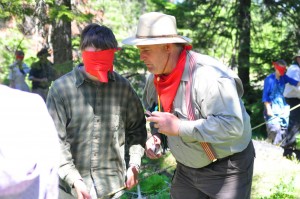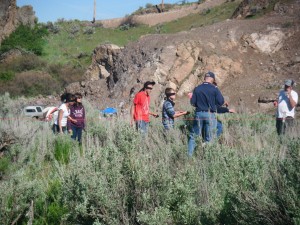At 16 I went to Camp Helaman. It was given the name to evoke thoughts of the 2000 stripling warriors. Many comparisons were made between the young men of which I was a part and the stripling warriors. Its purpose was as a missionary preparation camp. I had just missed the cutoff the year before, because my 16th birthday was in August, past the date of the camp. My friends returned from the camp claiming it was the best camp ever, and they couldn’t remember a time when they’d had better food and felt the spirit so strongly. One friend in particular said that he was sure that the camp had a special spiritual bubble around it where no enemy was allowed in, and spiritual power was amplified. As you can imagine I was pretty excited about the camp.
The camp was designed to promote “Spiritual experiences.” There were multiple testimony meetings every day. We had various activities to build our testimonies. There were returned missionaries telling us all about the wonderful experiences of their missions in Ireland and Asia. We had campfire meetings with our “districts” where we heard sappy stories about service and bore testimony to each other. We memorized scriptures and learned how to give discussions to each other.
Near the end of camp we were told that a special activity was waiting for us, and we wouldn’t be told what it was. After lunch we were lined up and given blindfolds. I was told to hold on to the shoulders of the guy in front of me and follow. We were taken along a path through the woods and then waited to see what would happen next. My bishop took my hand and guided me to the start of the journey, and placed my hand on a nylon rope. “Don’t let go of the iron rod,” he said, “and beware of Satan’s voice, he will lead you astray.” I followed the “iron rod,” until I came to a point where the rope branched off into two different directions. I didn’t remember Nephi mentioning the iron rod going off in two different directions, but I decided to go right. After all, “Choose the Right” had never led me astray before. Well, as it turns out, it did lead me astray, as I came to a tree with sharp branches and needles poking my arms and face. I felt like I was doing something wrong since I was really getting jabbed in the face by the tree. I felt around the tree to see if the rope continued, but no, it was a dead end. I turned around and went back and chose a different path.
The path of the iron rod continued over rocks, through trees, into ditches, and into dead ends. At some junctions, one of the leaders would give suggestions on which way to go. Some of the leaders spoke with deep, ominous voices, which meant they were Satan’s minions. Other times a voice I recognized as my bishop or my camp leader would speak sweetly and softly and tell me the correct path. Ropes were constantly tied to trees, which were either dead ends or I had to feel around to find where it went. I felt like an idiot getting jabbed by sharp pine needles, but I couldn’t worry about that.
Finally, I reached a point where my bishop took me from the iron rod. I resisted, since I wasn’t supposed to let go of the Word of God, but he assured me that I had to move to the next stage. He pointed me in the right direction and said, “Listen for the Spirit.” I listened carefully and began to hear voices singing hymns. I trudged up the grass covered mountain in their direction. After I reached the top someone told me to take off my blindfold and I saw a tree covered with letters hung with string from the branches. I searched for the letter addressed to me and then opened it to find a message from my mother. She told me that she was so proud of me and said that she knew that I would make the right choices in my life.
I looked down on the meadow and saw that some of my fellow campers couldn’t follow the voices as well as I did. One guy was marching off into the trees with a camp leader rushing towards him. One had just reached the end of the nylon rope and was refusing to let go. Apparently he was convinced that only a messenger of Satan would attempt to pull him from the iron rod. Once everyone had reached the end and eaten the pure love of God, I mean, read their letter, we had an opportunity to bear our testimonies. Nearly every young man stood and bore their testimony of the truthfulness of the gospel, how much the camp meant to them, and how strongly they had felt the Spirit as they got to hold to the iron rod in real life. Tears streamed from the faces of the tough football players. I felt bad that I did not feel the same emotion that they did. I was sure that I wasn’t feeling the Spirit like they were because of all of my sins. I stood to bear my testimony, and sang, “Hold to the rope, the nylon rope, ‘tis braided strong and true!” They laughed, snorting the snot that had developed from crying, and I continued with a few jokes and finished with a rote testimony.
We had a final testimony meeting where every boy was pressured into bearing his testimony. Many of the parents had showed up to hear them. There were even more tears at that meeting than after find the tree of life. At the end of the camp we were asked individually how we felt about the camp and what could be improved. I said that I enjoyed the camp, but hoped that we could go to bed earlier and that I would appreciate 2-ply toilet paper.
The next year I was given the opportunity to help set up the iron rod activity. To my surprise it wasn’t merely an accident that the nylon rope ran into cacti and trees, we were told to specifically find the gnarliest trees to connect the rope to. I couldn’t believe how dangerous we were making this obstacle course when blindfolded teenagers were supposed to be following it. I was then asked to become one of Satan’s minions. I found a point where the correct direction to go was left, and then told each of my peers that he should, “Choose the Right.” I was almost hurt that so many of them knew immediately not to trust me. One not particularly bright Priest was stuck in a loop and we had to go get him so that he would go the right direction. We had to help all of them when they got to a particularly steep ditch.
It was during all of this that I realized that this activity had little to do with the Gospel, or the Iron Rod. This entire exercise was designed to generate an emotional response in us. Of course the activity is fake. I didn’t “follow the
Spirit” at the meadow, I just followed the (not especially great) voices to the end. I wasn’t crying my eyes out at the end because I’m not an emotional person. I don’t mean that I don’t feel any emotion; I just mean that crying isn’t something I do with any regularity. The last couple times that come to mind are when my son was born and the beginning of the Pixar movie “Up.” I don’t remember crying at all during any of my time at Camp Helaman. The exercises existed to “invite the Spirit,” but mostly they just taught young men to confuse emotion with the Spirit. It’s the same reason we were told fake stories each night around the campfire. It’s the same reason those same stories spread so quickly around Facebook even when the stories are obviously fake. The people “sharing” them don’t care if they’re real, they only care about how they felt when they read them.
Unfortunately I am/was too jaded of a young man to care. Once I knew that the story wasn’t real, or that this wasn’t a real iron rod, I couldn’t enjoy it. Maybe the other young men were able to see past the metaphor to learn their lessons, but I couldn’t. I couldn’t help but point out the ridiculousness to those around me, which is why my testimonies generally devolved into standup comedy routines. The attempts to play up my emotions worked in the opposite direction. It bothered me that I was being manipulated.
I believe that the approach used often in youth programs can be dangerous. President Boyd K. Packer said, “The spiritual part of us and the emotional part of us are so closely linked that it is possible to mistake an emotional impulse for something spiritual” (“The Candle of the Lord, Jan. 1983 Ensign). When “fake” experiences are used to try and give real spiritual experiences, emotion is more likely to follow than the Spirit. Youth are taught that the emotion they feel is the Spirit teaching them. This leads to adults that don’t know what the Spirit is.
Of course, what the Spirit feels like is difficult to pin down. Burning in the bosom (D&C 9:8) has been confusing Mormon youth for generations. “I have met persons who told me they have never had a witness from the Holy Ghost because they have never felt their bosom ‘burn within’ them. What does a ‘burning in the bosom’ mean? Does it need to be a feeling of caloric heat, like the burning produced by combustion? If that is the meaning, I have never had a burning in the bosom. Surely, the word ‘burning’ in this scripture signifies a feeling of comfort and serenity.” (Dallin H. Oaks Ensign, Mar 1997, 13)
I identify much more strongly with feeling that I’ve come to the right conclusion after thinking things through. I can also relate to “flashes of insight.” We are children of God on a pathway to Godhood. We are capable of God-like thoughts if we simply train to think them. This resonates with me much better than a cosmic being having control of the on/off switch on my “bosom burner.” Empowering youth to think decisions and ideas through and listen when things feel right is much more effective than playing up their emotions. They can be empowered further to let them know that following the Spirit is a journey, and God allows us to make the wrong decisions. It’s all part of learning. Youth should be taught to examine their motives, what it’s important to pray for (and what’s not), and how there are many ways to feel the Spirit.
It’s much easier to ramp up the emotion with youth than it is to try to teach them to follow the Spirit. Perhaps that’s why this type of teaching has caught on. Unfortunately this can lead to disappointment. Or in my case, it never worked at all. I hope that youth leaders will avoid the easy route and teach real lessons to the youth of the Church.








I like getting emotional. But it was a long time before I came to know that the spirit speaking to me was much more than an emotional response.
“Youth are taught that the emotion they feel is the Spirit teaching them. This leads to adults that don’t know what the Spirit is.”
This would explain why so many of our members have testimonies of things that are not even doctrinal.
I friend forwarded this link to me and you gave me some very important insight into my daughter who is struggling with the church on a few different levels, but I believe this is one of them. She sees through stuff like that and feels manipulated, which has created a distrust in her toward leadership. I had never seen it quite like that. Thank you for your post. I appreciate it very much.
I’m glad the blog post was meaningful to you, Josi!
I am blown away by this post. THANK YOU THANK YOU! I have thought this for years and with the rise of “Trek” (in my neck of the woods) I was becoming more unhinged from the manipulation of emotion that I was seeing. Thank you for writing in such a way that it is clear and succint!
Thanks for the kind words, Lisa. This post has resonated with more people than I could have imagined.
Perfectly said. Paul and I have spoken about this at length. When I was the Young Men’s President of my ward, I let it be known that I was concerned with how we spiritually manipulate our youth and conflate emotion with the Spirit. I agree with you that this is done out of laziness.
I remember listening to an interview with Fiona Givens. When she was investigating the Church, she would listen to any cassette recording that the missionaries gave here, except music. She knew that music could manipulate her emotions.
We must learn the difference between providing an atmosphere where the Spirit can reside and testify and manipulating people. There is a BIG difference.
When we don’t do that, we have adults that question their spiritual experiences that brought them to the conclusion that the “Church is true”. They then wonder if what they thought was a spiritual confirmation, was just emotion. We are slowly killing ourselves and it is all our fault. Shame on us.
If only we had more Young Men’s leaders like you, Michael.
Well done, L. Thomas. Thanks for writing this. I remember the pioneer trek I took as a teenager (including the slaughter of a sheep for dinner with all the youth being compelled to watch. This didn’t go over so well) and many YW camp experiences that seemed contrived and superficial.
I also remember many moments in those camp experiences when I felt the spirit as a quiet and often emotional witness of any number of truths: That God was in the elements of earth surrounding me; that I was connected to the adults who were there-they were truly my “brothers and sisters”; that silence made room for the spirit and I should foster silence in my life. And even a witness that Jesus Christ was my savior. I don’t remember the way in which these things came about, but the feelings are not associated with any specific organized activities.
For me, emotion is, in fact, an outcropping of spiritual witness. This is not true for everyone. But for me, awareness of certain truths enlarges my spirit in a way that my body cannot contain and it seems to spill over as emotion. It is clear that this emotion is a direct result of spiritual witness. The emotional manipulation you describe is a problem, no doubt. And you were fortunate to find your own way around that. For others of us, those types of contrived experiences fall by the wayside as we mature and understand the difference between emotion of spiritual witness vs. emotion for other reasons.